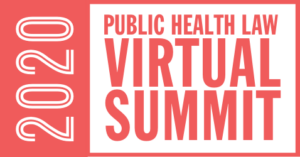
Governance and Decision-Making in a Pandemic
Concurrent Session Block 3: 12:00 – 1:00 p.m. ET Thursday, September 17
Presentations
Executive Decision Making for COVID-19: Public Health Science through a Political Lens
Executive decision making is the crux of using law to achieve public health objectives. But public health codes and emergency declaration laws are not self-executing. This session will examine how elected officials and public health officers have used their legal authority to address the COVID-19 pandemic. It will include an overview of an executive decision-making tool for public health officials and describe the general legal background in which these decisions have been made. The presenters will apply the decision-making tool to how governors in eight states have determined whether to issue stay-at-home orders and when to relax these restrictions.
- Peter D. Jacobson, JD, MPH, University of Michigan
- Denise Chrysler, JD, Director, Network for Public Health Law—Mid-States Region Office
Upholding Tribal Sovereignty and Promoting Tribal Public Health Capacity during the COVID-19 Pandemic
Tribes are sovereign nations with authorities and responsibilities over their land and people. This inherent sovereign authority includes the right to promote and protect the health and welfare of their communities. The COVID-19 pandemic has brought national attention to the health inequalities experienced by American Indian and Alaska Native communities. The sovereign legal authority for Tribes to respond to this pandemic has received less attention. In this session, the presenters will discuss some of the urgent legal issues impacting Tribal response to the COVID-19 pandemic along with recommendations on how law can be better used to support Tribal responses as the pandemic unfolds.
- Aila Hoss, JD, Assistant Professor of Law, University of Tulsa College of Law
- Heather Tanana, JD, MPH, Assistant Professor & Wallace Stegner Center Fellow, The University of Utah S.J. Quinney College of Law